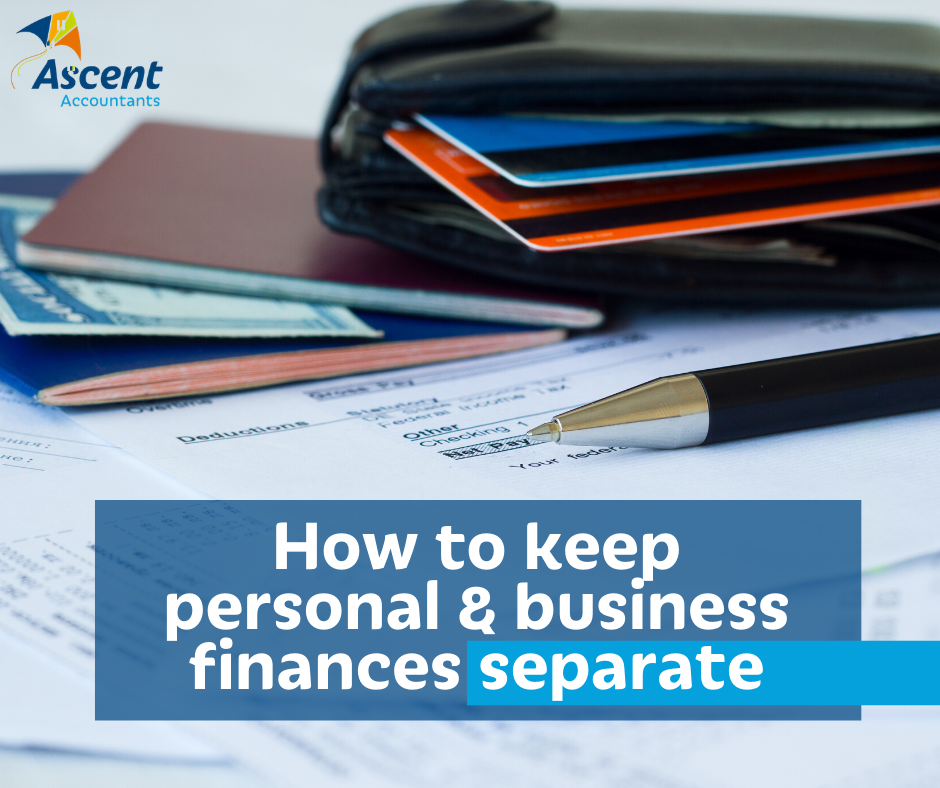How to keep personal and business finances separate

Set up separate accounts
Having separate accounts is an obvious and vital first step to keeping your personal finances and business finances separate. This way there is a clear and defined separation between the two.
If you are careful, diligent and make sure to only spend for business purposes from your business account and personal purposes from your personal account, it makes keeping your business and personal finances separate very easy and will help keep track of your budgeting as well.
This also helps a lot at tax time!
Keep your receipts separate
It really helps to physically keep business and personal receipts clearly separated. How you do this is totally up to you, but keeping track and staying organised is very important.
It is especially important to keep hold of all your business receipts in case of a tax audit – in which case your business receipts are more of a necessity than personal ones.
Get a credit card for the business
Having a business credit card helps you to build up a credit history for your business that is separate to your personal credit history.
This clear divide will also help curb the want to use personal finances when something business related is a little out of reach.
Give yourself a salary
Paying yourself is very important! Like you would for any employee, you need a regular and constant sum that you can budget for within the business. Sticking to this is important and you should avoid giving yourself more or less than you have budgeted for where possible.
Another positive reason to do this is so that you are aware of your personal income and can budget within your personal life to.
Set clear business budgets
It is equally important to not pull money out of your business as it is to not have the business drain your personal finances. It is very common for small business owners to start to use their own money to give their business a boost when needed.
Sometimes this is unavoidable, but if you set a clear and realistic business budget that is based on your business/ current earnings, you should be able to avoid this.
Communicate the separation
As much as you personally managing the separation between business and personal finances is important, so is communicating the differences and divides between business and personal to other people involved.
This can include partners whom you share personal accounts with, through to anyone who is involved with your business finances. Everyone being on the same page in regards to your accounting really helps prevent problems further down the track.
Understand what a business expense is and what isn’t
One of the biggest traps small business owners fall into is wanting to claim entertainment, food and travel expenses as business expenses that can then be used as tax deductions.
As tempting as this can be, when these expenses are personal they don’t qualify as business expenses, no matter how you spin it – so it’s not worth getting penalised by the tax department for it.
Clearly separate your home and your office
This one is a big one, especially if you work from home.
Creating a divide between your office and your home is really important as it’s much easier to determine what can be classified as office expenses, including bills.
Keep logs of business use
If you regularly use personal items for work, such as your phone or car, you should try and keep track of the split. This can be a bit tricky but there are plenty of resources available that will help record the split.
Keeping a log is an easy and simple way to establish that divide between personal and business usages.
Talk to a professional
All of this can be understandably overwhelming, so bringing in a professional accountant is always a good option. You want to avoid mistakes wherever possible, so sometimes you need to bring in an accountant who really knows what they are doing.
Here at Ascent, we specialise in small businesses and can help you with any questions you have, and have a variety of resources to help you ace your finances.
Contact us on 08 6336 6200
Need help with your accounting?








